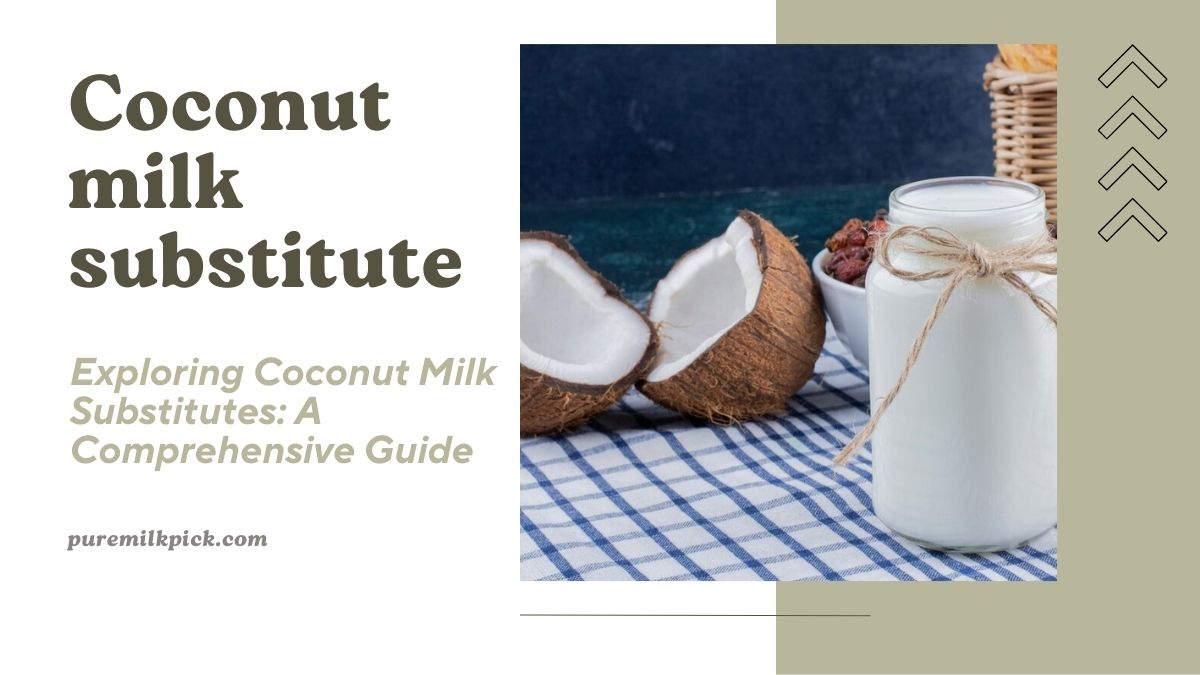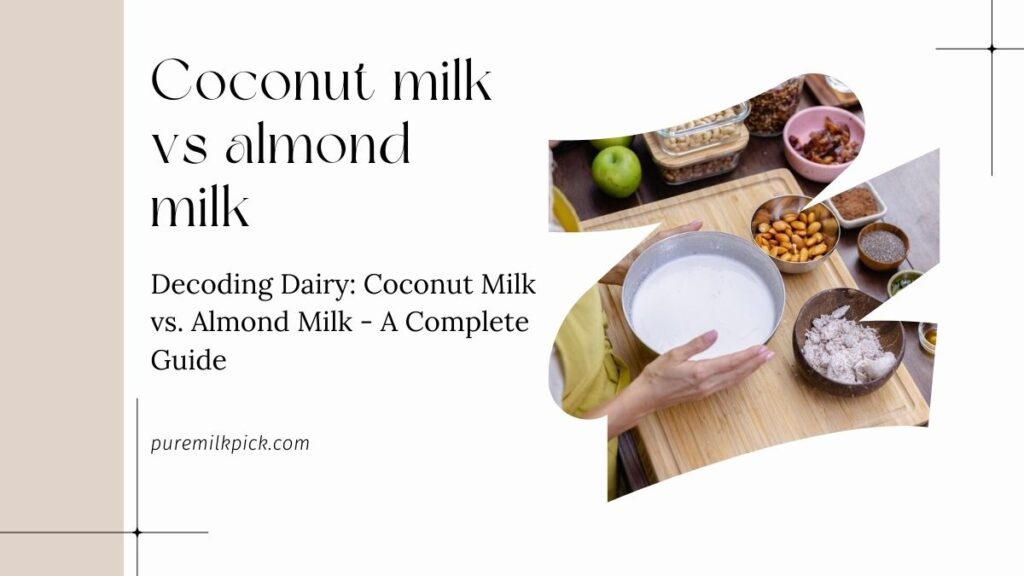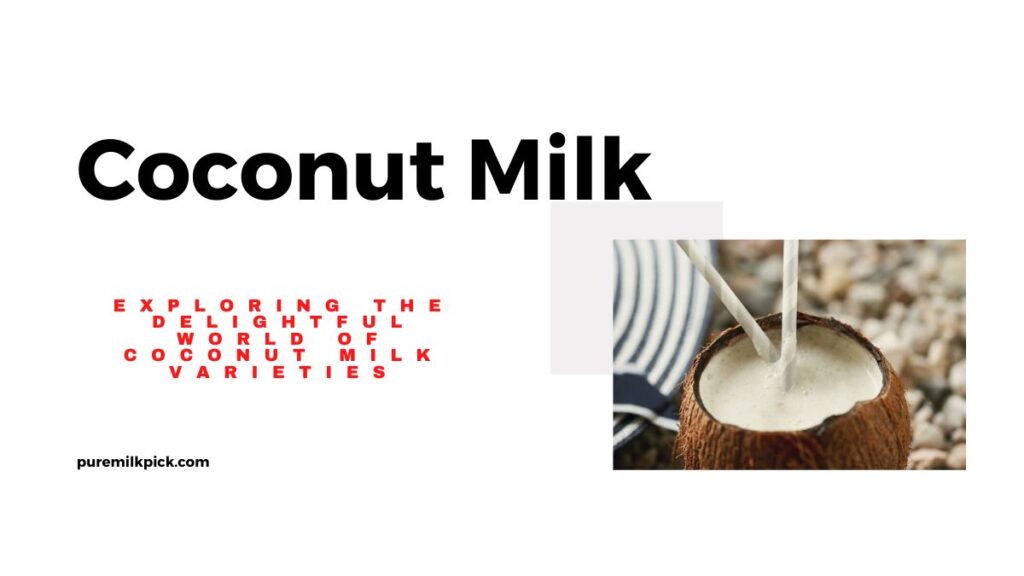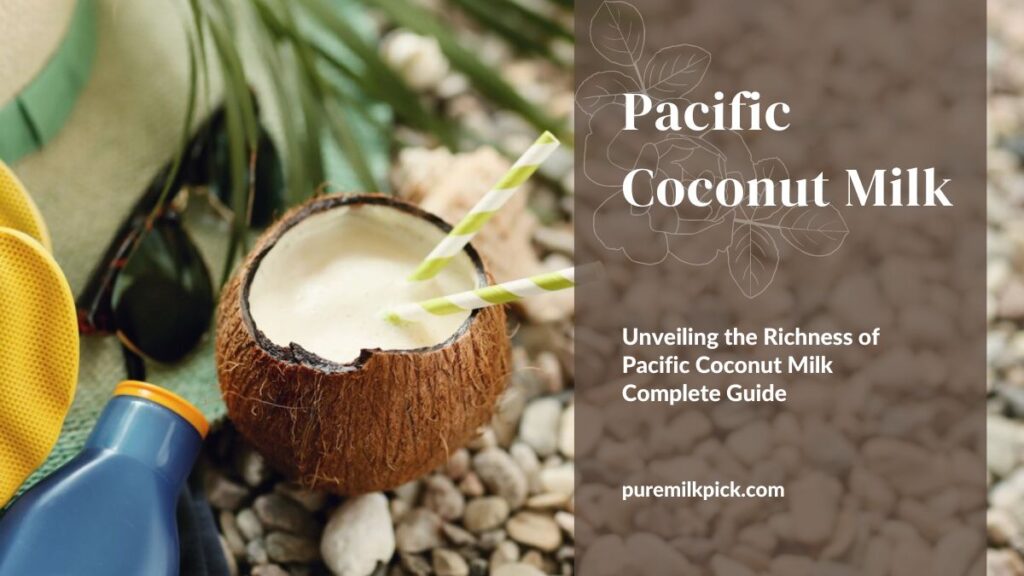Welcome to the exciting world of coconut milk substitutes! Whether you’re a seasoned chef looking to experiment with new flavors or a home cook seeking dairy-free alternatives, this comprehensive guide will equip you with the knowledge and inspiration to elevate your culinary creations. From nut-based milk to homemade concoctions, we’ll explore a variety of options that promise to tantalize your taste buds and suit various dietary needs.
Understanding Coconut Milk
What is coconut milk?
Coconut milk, extracted from the flesh of mature coconuts, is a versatile ingredient that adds a rich and creamy texture to dishes. With its distinct tropical flavor, coconut milk is a staple in many cuisines around the world, from Thai curries to Caribbean desserts. However, despite its popularity, coconut milk may not always be suitable for everyone due to dietary restrictions or availability concerns.
Read More: Unveiling the Richness of Pacific Coconut Milk Complete Guide
Coconut milk contains high levels of saturated fat and calories, making it a rich addition to recipes. While this richness enhances the flavor and texture of dishes, it may not be suitable for individuals following low-fat diets or those with certain health conditions. Additionally, coconut milk is not a suitable option for individuals with nut allergies, as coconuts are classified as tree nuts.
The Need for Alternatives
While coconut milk offers unique flavor and texture, there are several reasons why you might seek alternatives. Whether you’re looking to accommodate dietary restrictions, prefer a lighter option, or simply don’t have coconut milk on hand, having substitutes readily available can save the day. Exploring alternative options also allows for creativity and versatility in the kitchen, enabling you to adapt recipes to suit your preferences and needs.
Dietary Restrictions
For individuals with nut allergies or sensitivities, coconut milk may not be a viable option due to its classification as a tree nut. In such cases, it’s essential to explore alternative milk options that offer similar richness and creaminess without the risk of allergens. Additionally, for those following specific dietary plans such as ketogenic or low-carb diets, coconut milk’s moderate carbohydrate content may necessitate the need for alternatives with lower carb counts.
Availability and Convenience
While coconut milk is widely available in most grocery stores, there may be instances where it’s out of stock or challenging to find. Relying solely on coconut milk can be limiting, especially if you’re preparing a recipe that calls for this ingredient. Knowing alternative substitutes ensures flexibility and adaptability in the kitchen, allowing you to substitute ingredients based on availability and preference seamlessly.
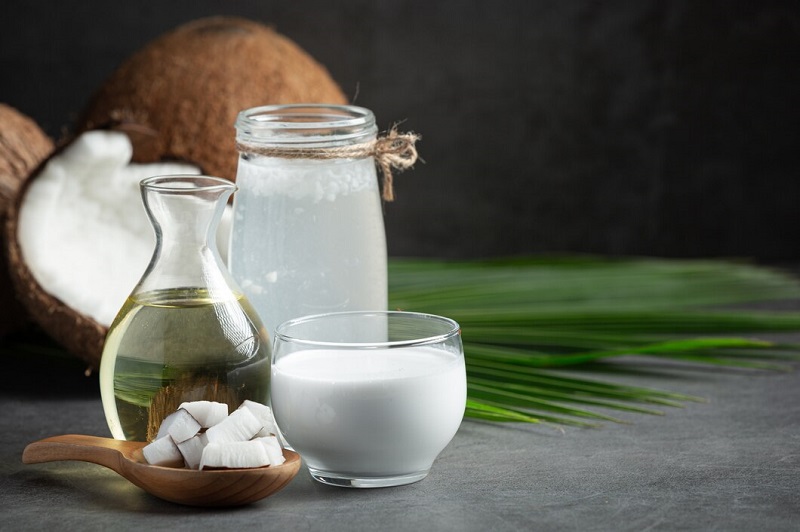
Exploring Coconut Milk Substitutes
Now that we’ve established the importance of having alternatives, let’s delve into the world of coconut milk substitutes. From store-bought options to homemade concoctions, there’s no shortage of alternatives to suit various dietary preferences and culinary needs. Below, we’ll explore some popular coconut milk substitutes and how to incorporate them into your favorite recipes.
Nut-Based Milk
Nut-based milk, such as almond milk, cashew milk, and macadamia milk, offer a creamy texture and subtle nutty flavor reminiscent of coconut milk. These dairy-free alternatives are readily available in most supermarkets or can be easily made at home with minimal ingredients. To make nut-based milk at home, simply soak raw nuts in water, blend until smooth, and strain to remove any solids. Nut-based milk is a versatile addition to both sweet and savory dishes, making it a perfect substitute for coconut milk in recipes such as curries, smoothies, and baked goods.
Oat Milk and Rice Milk
For those with nut allergies or sensitivities, oat milk and rice milk emerge as excellent alternatives to coconut milk. With their mild flavor profiles and creamy textures, oat milk, and rice milk are suitable substitutes in a variety of recipes, from creamy soups to decadent desserts. Oat milk, in particular, has gained popularity for its sustainability and environmental benefits, making it a preferred choice for environmentally conscious consumers. Whether store-bought or homemade, oat milk and rice milk provide a nutritious and delicious alternative to coconut milk in a wide range of culinary applications.
Soy Milk and Hemp Milk
Soy milk and hemp milk are nutrient-rich alternatives to coconut milk that offer a creamy texture and neutral flavor. Soy milk, made from soybeans, is a rich source of protein and essential nutrients, making it a popular choice among vegans and vegetarians. Hemp milk, derived from hemp seeds, boasts a slightly nutty flavor and is packed with omega-3 fatty acids and other beneficial compounds. Both soy milk and hemp milk can be used interchangeably with coconut milk in recipes such as sauces, smoothies, and baked goods, providing a nutritious and dairy-free alternative for those with dietary restrictions or preferences.
Homemade Coconut Milk Alternatives
For those who prefer to take a hands-on approach, crafting homemade coconut milk substitutes allows for customization and control over ingredients. With just a few simple steps, you can whip up creamy concoctions using readily available ingredients. Below, we’ll explore some homemade coconut milk alternatives and how to incorporate them into your favorite recipes.
Homemade Almond-Coconut Milk Blend
Combine the richness of almonds with the tropical essence of coconut by creating a homemade almond-coconut milk blend. To make almond-coconut milk at home, soak raw almonds and shredded coconut in water, blend until smooth, and strain to remove any solids. The result is a luscious milk alternative perfect for adding to coffee, cereal, or your favorite recipes. Experiment with different ratios of almonds to coconut to customize the flavor and consistency to your liking.
Creamy Cashew Milk
Indulge in the velvety texture of cashew milk, a luxurious alternative to coconut milk. To make cashew milk at home, soak raw cashews in water, blend until creamy, and strain to remove any solids. The result is a creamy and indulgent milk alternative that’s perfect for adding to smoothies, soups, or desserts. Customize the flavor of your cashew milk by adding vanilla extract, cinnamon, or maple syrup for a touch of sweetness.
Silky Hemp Seed Milk
Harness the nutritional benefits of hemp seeds by whipping up a batch of homemade hemp seed milk. To make hemp seed milk at home, blend hemp seeds with water until smooth, and strain to achieve a silky consistency. The result is a creamy and nutrient-rich milk alternative perfect for adding to coffee, tea, or your favorite recipes. Experiment with different flavors by adding cocoa powder, dates, or coconut sugar for a delicious twist.

Incorporating Coconut Milk Substitutes into Recipes
Now that you’re well-versed in the world of coconut milk substitutes, it’s time to put your newfound knowledge into practice. Whether you’re cooking up a storm in the kitchen or experimenting with new flavors, there are countless ways to incorporate these alternatives into your favorite recipes. Below, we’ll explore some creative ways to use coconut milk substitutes in various dishes.
Savory Dishes
Swap out coconut milk for your preferred alternative in savory dishes such as curries, soups, and stews. The creamy texture and subtle flavors of nut-based or plant-based milk add depth and richness to traditional recipes without compromising on taste. Experiment with different combinations of spices and herbs to create unique flavor profiles that suit your palate.
Sweet Treats
From decadent desserts to creamy smoothies, coconut milk substitutes are ideal for adding a touch of indulgence to sweet treats. Whether you’re baking cookies, whipping up a batch of ice cream, or creating a luscious pudding, these alternatives provide the perfect dairy-free base for your culinary creations. Experiment with different flavors and textures to create mouthwatering desserts that satisfy your sweet tooth.
Beverages
Get creative in the beverage department by incorporating coconut milk substitutes into your favorite drinks. Whether you’re blending up a refreshing smoothie, frothing milk for a latte, or crafting creamy cocktails, these alternatives offer endless possibilities for experimentation. Experiment with different flavor combinations and textures to create unique and delicious beverages that are sure to impress.
Conclusion
In conclusion, exploring coconut milk substitutes opens up a world of culinary possibilities for both seasoned chefs and home cooks alike. Whether you’re seeking alternatives due to dietary restrictions, availability concerns, or simply a desire to experiment with new flavors, there’s a perfect option waiting to elevate your recipes to new heights. From nut-based milk to homemade concoctions, the possibilities are endless for crafting delicious dairy-free alternatives. So go ahead, unleash your creativity in the kitchen, and savor the satisfaction of discovering your new favorite coconut milk substitute.
Frequently Asked Question
While coconut cream shares similarities with coconut milk, it’s thicker and richer in consistency due to its higher fat content. While it can be used as a substitute in certain recipes, it may alter the texture and flavor, so adjustments may be needed. Coconut cream works well for creating creamy sauces, desserts, and beverages but may not be suitable for diluting or thinning out like coconut milk.
Several dairy-free alternatives can replace coconut milk in baking recipes. Nut-based milk like almond milk, cashew milk, or macadamia milk are excellent choices, providing a similar creamy texture and subtle nutty flavor. Oat milk and rice milk are also suitable options, offering a mild taste that won’t overpower baked goods. When selecting a substitute, consider the flavor profile of your recipe and choose an alternative that complements it.
If you’ve made a homemade coconut milk substitute and find it too thin for creamy dishes like curries or soups, there are several ways to thicken it. One option is to simmer the milk over low heat to evaporate some of the liquid, resulting in a thicker consistency. Alternatively, you can add a thickening agent like arrowroot powder, cornstarch, or tapioca starch dissolved in water and simmer until the desired thickness is achieved. Experiment with different methods to find the one that works best for your recipe and preferences.
